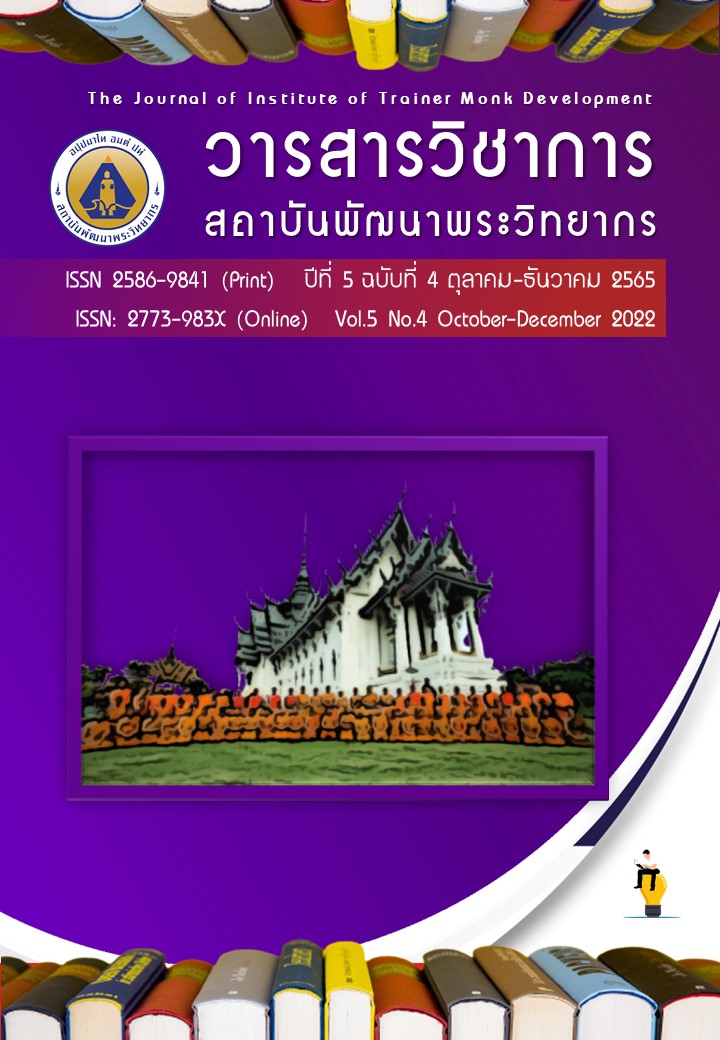The Development of Academic Achicvement under History of Thai Literature and Masterpieces (ED1020) Using Learning Activities Based on Rasep Model for The Second Year Students in Teaching Thai Language Program in Mahamakut Buddhist University Lanna Campus
Main Article Content
Abstract
The objectives of this research were to 1) develop learning activities in the ED1020 course: History of Thai Literature and Literature. 2) To develop academic achievement in the ED1020 History of Literature and Literature course in Thailand. 3) To study the opinions of second-year students in the Thai language teaching program. The research model was action research with 3 operational cycles. Mahamakut Buddhist University Lanna Campus, 54 people. Research instruments. Classified by nature of use in 3 types 1) The tools used in the practice. 2) The results of learning activities in each activity plan. and 3) a tool that Used to assess the effectiveness of learning management. The statistics used in the data analysis were mean, percentage, standard deviation.
The results of the research can be summarized as follows: 1) The results of the development of learning activities. By organizing learning activities based on the concept of RASEP Model, there are 5 steps: Step 1 Research, Step 2 Analysis, Step 3 Synthesis, Step 4, Explicit Knowledge. Knowledge) Step 5 Presentation (Presentation) The results of the activities found that able to meet the needs of learners, suitable for the target group and contributing to an appropriate learning atmosphere, organized systematic activities As a result, the students' achievement results passed the specified criteria. 2) The academic achievement of the second-year students. The learning activities through the RASEP Model can be developed for students to have average achievement scores of 80.50 percent, which is higher than the specified criteria; 3) second year students. There were opinions on the learning activities of the RASEP Model at a high level.
Article Details

This work is licensed under a Creative Commons Attribution-NonCommercial-NoDerivatives 4.0 International License.
บทความที่ได้รับการตีพิมพ์เป็นลิขสิทธิ์ของวารสารวิชาการสถาบันพัฒนาพระวิทยากร
ข้อความที่ปรากฎอยู่ในบทความที่ได้รับการตีพิมพ์ในวารสาร ถือเป็นความรับผิดชอบของผู้เขียนบทความ และข้อคิดเห็นนั้นไม่ถือว่าเป็นทัศนะและความรับผิดชอบของกองบรรณาธิการวารสารวิชาการสถาบันพัฒนาพระวิทยากร
References
ชัยวัฒน์ สุทธิรัตน์. (2561). 80 นวัตกรรมการจัดการเรียนรู้ที่เน้นผู้เรียนเป็นสำคัญ. (พิมพ์ครั้งที่ 8). นนทบุรี: พี บาลานซ์ดีไซด์แอนปริ้นติ้ง.
ดิเรก พรสีมา. (2559). ครูไทย 4.0 กระทรวงศึกษาธิการ. กรุงเทพฯ : สำนักปลัดกระทรวงกระทรวงศึกษาธิการ.
พระมหาอภินันท์ นนฺทภาณี (คำหารพล) และคณะ. (2562). การพัฒนาผลสัมฤทธิ์ทางการเรียนโดยใช้การเรียนรู้เชิงรุก สาระหน้าที่พลเมืองของนักเรียนชั้นประถมศึกษาปีที่ 2 โรงเรียนเทศบาลวัดศาลามีชัย อำเภอเมือง จังหวัดนครศรีธรรมราช. วารสารมหาจุฬานาครทรรศน์ 6(3), 1148–1160.
ราชกิจจานุเบกษา. (2542). พระราชบัญญัติการศึกษาแห่งชาติ พ.ศ. 2542. กรุงเทพฯ: สำนักงานคณะกรรมการการศึกษาแห่งชาติ สำนักนายกรัฐมนตรี.
วิจารณ์ พานิช. (2555). วิถีสร้างการเรียนรู้เพื่อศิษย์ในศตวรรษที่ 21. กรุงเทพฯ: มูลนิธิสดศรีสฤษดิ์วงศ์.
สุภาพร เตวิยะ. (2565). การจัดการเรียนรู้เชิงรุกเพื่อพัฒนาผลสัมฤทธิ์ทางการเรียนและความเชื่อมั่นในตนเองของนักศึกษาสาขาภาษาอังกฤษ คณะครุศาสตร์ มหาวิทยาลัยราชภัฏเชียงราย. วารสารวิชาการมหาวิทยาลัยราชภัฏศรีสะเกษ 16(1), 122–134.
อรรถพงษ์ ผิวเหลือง. (2565). การจัดการเรียนรู้แบบ RASEP Model. วารสารสังคมศาสตร์ปัญญาพัฒน์ 4(1), 19–26.


